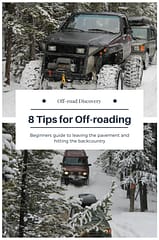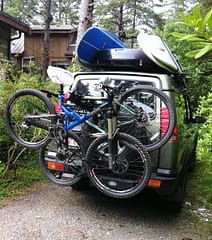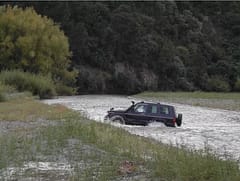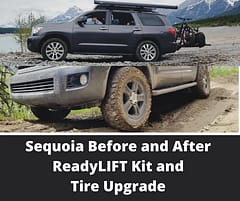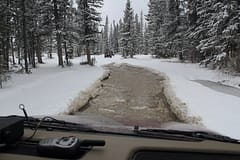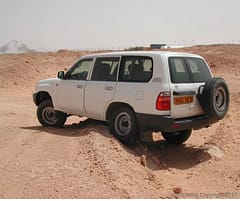Beginners Guide To Off-Roading
Top 8 Things To Know When Leaving The Pavement For The First Time
Contents
- Introduction
- 1. Vehicle Reliability
- 2. Tires and Tire Pressures
- 3. Going Through Water
- 4. Communication Device
- 5. Using Your Gears
- 6. Recovery Gear and Supplies
- 7. First Aid Kit
- 8. Where to Go
Introduction
Everyone has a first time for everything. We belong to several overland, off-road and Land Rover community groups and many people involved seem well seasoned off-roading. There will always be the newbies, just like we were, that haven’t yet left the pavement but would like to. So we are going to take away the need of asking these possibly intimidating groups for advice and just tell you what we think you need to know before you go.
1. Vehicle Reliability
It’s a sad fact that no vehicle can ever be considered 100% reliable but some are better than others and you can help shorten the odds of something going wrong. With a little due diligence and preparation you’ll be able to develop a confidence level in your vehicle’s reliability that will pay you back. This will start by asking yourself a few key questions:
- When was the last time I had my vehicle serviced?
- If it was serviced was anything pointed out to be aware of?
- Are there any fluids leaking from my vehicle? If so how much and what fluids are they? Oil sweating from an oil pan gasket is much less of a priority than coolant leaking out of your head gasket or brake fluid leaking which is obviously a serious issue.
- How old is your battery and have you recently needed a boost to start your car? If so you may want to consider having your battery inspected or replace it with a new one.
- Do your windshield wipers work and do you have windshield wiper fluid? It sounds simple but the basic things are often the most important and sometimes overlooked.
- Are all your lights working? Even an interior bulb that’s out can be a pain while in the backcountry and you’re fishing around in your vehicle and can’t see (of course a headlamp also helps).
If you are looking for recovery gear or spare parts, check out local shops or online at Atlantic British.
Do a Full Vehicle Look Over, Be Very Familiar With It
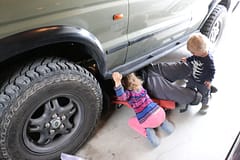
2. Tires and Tire Pressures
What season are you driving in and do you have the appropriate tires for that season? There is a big different between summer and winter tires and not every all-season tire is created equal. For icy mountain driving, studded tires are key. Do any of your tires have a slow leak? We’ve written before about the tires we use for our adventures, and why. For tire pressure check the inside of the door frame on the drivers side - recommended tire pressure info will be noted on a sticker. On our Land Rover our tire sizes vary but the tire pressures remain the same.This may not be the case for all vehicles so take a few moments to research what is needed for your vehicle and tires.
Inside Drivers Door Shows Vehicle Specs
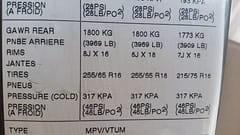
3. Going Through Water
If your travel plans may include the occasional water crossing do you know your vehicles safe water fording capabilities? First and foremost, where is the air intake on your vehicle? At the very minimum you cannot let water go into your engine. Unless your vehicle is a diesel it will be reliant on electronic spark plugs and ignition systems to maintain engine combustion. WD-40 and other water displacement lubricants can help protect some of these components if absolutely required and only for a short period of time.
Does your drive train require diff breathers? On many vehicles especially those with solid axles they require breathing holes to prevent over pressurization with high RPMs. As result of this, breathing tubes are required when submerging these components. These tubes are generally run into the engine bay or a vehicles snorkel if one has been installed. If you have any leaks coming out of your differentials, transmission or transfer case you would be wise to replace these fluids for fear of water contamination after any type of water submersion.
Water Crossing to go Backcountry Camping
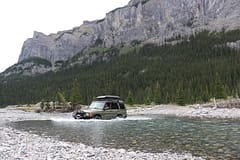
4. Communication Device
Many off-road locations are out of cell phone range. In order to provide yourself with a Plan B that doesn’t involve jogging to the nearest cell phone or service station an alternative communication is important. There are many GPS based communicators such as SPOT, inReach and Satellite phone which can be a lifesaver or certainly save a great deal of inconvenience. CB or higher powered radios can also provide emergency communication and are good on logging roads for logging trucks to be able to announce their presence on specific radio channels.
5. Using Your Gears
Do you really know how your 4WD / AWD system works? If not check out our description on how to use your gearing options. Also use the vast number of you tube videos out there - they are fun to watch and will give you a good understanding of what to do in different situations.
Video on How to use 4WD Low in Disco 2:
6. Recovery Gear and Supplies
At the most basic level of preparedness you should know where the recovery points on your vehicle are located. We’ve come across many people that don’t know what or where their recovery points are. These are the points from which a hook and strap can be attached from one vehicle to another in order to pull a vehicle from being stuck. In most cases these locations will be identified in your owners manual. Sometimes they require a small plastic plate to be removed from your front or rear bumpers and a giant metal bolt with a loop at the end to be screwed into the bumper itself. In other cases there are clearly visible metal hooks protruding from the bumper. Trailer hitches with the proper attachments can also act as an ideal recovery place. If you happen to have a winch test it out before you know you need it because there is nothing quite as disheartening as a winch not working at the one time you actually have a need for it. A discussion of recovery points must go hand in hand with clevis and snatch straps which you can get at your local auto-part store.
The Recovery 4x4 Goddess
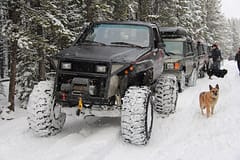
7. First Aid Kit
A must for any house or car. There are choices from basic to full paramedic set up. You get out as much as you put into the kits. From band-aids, tape, gauze and scissors, all the way up to splints, slings, sutures, Epi pen and crazy glue. You can buy pre-built first aid kits. No matter what level you decide to choose, the difference between something and nothing is huge - so get something! Make note if any member of your off-road party that have any special requirements, especially things like Epi Pens for those with allergies.
It’s a Long Way to Help
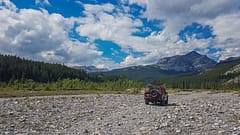
8. Where to Go
Research local clubs and groups in your area. There is a good chance there is a local Facebook group dedicated for off-roading or ask on a forum you belong to. If you want to improve your off-road skills, look into an overland guide or agency. Our local Land Rover mechanic shop puts together a few annual outings. Everyone we have met in the community has been excited to have a new member join and are open and welcoming to both new or experienced people. Go on a day trip and play around a little before an over-night trip if possible. This will gain your confidence and make you think of other things you may want to have or understand before a bigger trip.
Always have fun and enjoy the ride!
Local 4x4 Trip in Alberta, Canada
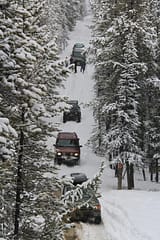
This site uses affiliate links where we make a commission off sales made, no extra cost to you but we appreciate the support to keep this site running.
